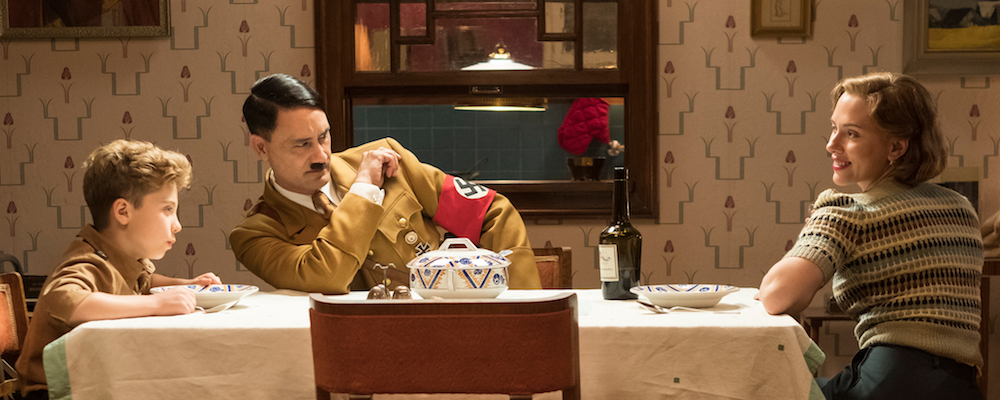Filmmaker Taika Waititi and Scarlett Johansson on Satirizing the Third Reich in ‘Jojo Rabbit’
Sandra Miska
In his follow-up to “Thor: Ragnarok,” filmmaker Taika Waititi has proved that he’s not one to shy away from risks with “Jojo Rabbit,” an imaginative come-of-age dramedy set in Nazi Germany. In an even more daring move, Waititi himself plays Hitler (sort of), who serves as the imaginary best friend of the film’s boy protagonist, Jojo (Roman Griffin Davis), a dedicated member of the Hitler youth who starts to question everything he’s been taught after discovering his mother, Rosie (Scarlett Johansson), is hiding a young Jewish woman (Thomasin McKenzie) in their home. Waititi, along with Johansson, Davis, McKenzie, and Stephen Merchant, recently sat down with Entertainment Voice to discuss the film, which is unlike anything else out there at the moment.
“There weren’t as many Nazis around then. It feels more relevant.” Waititi said of how today’s environment has differed from when he first started the project in 2011, before the rise of numerous hate groups. “At the time, it was more of a reflection of what children go through during war, during conflict, and how they see adults operate and what they take away from it.”
Waititi also manages to pack in heart along with the laughs and the drama, particularly in one memorable scene in which Rosie distracts her angry son by doing an impression of his absent father. Although Johansson’s comedic side shines through here, she explained why the scene wasn’t necessarily funny to her.
“She’s a single mom who is on the edge all the time. She’s scared for her life, for her child’s life… She doesn’t know what the future holds for her and her son, and then she looks across the table and sees this little boy who, in one moment represents everything that she hates, but he’s her own son, and she temporarily loses it, but then comes back to herself. But temporarily losing it felt scary to me. So much that I was shaken by it.”
So disgusted is Waititi by the actual historical Hitler that he couldn’t even bring himself to say his name during the interview. However, he did go in-depth about his complicated feelings about the role that he gave himself.
“It doesn’t make you feel empowered,” he said of directing in a Nazi uniform. “It doesn’t make you feel like anyone really wants to listen to you. But I had to own it in some way, and I had to remind myself that I’m not playing that guy. And I wasn’t about to give that guy the satisfaction of doing any research into what he was like, the nuances, his physicality, because I don’t think he really deserves that… I just decided to play him as a ten-year-old, really. Because he comes from a ten-year-old’s mind. It made it more bearable.”
Indeed, it wasn’t important so much to the cast and crew to be historically accurate as it was for them to focus on the story and the emotions. “Not one accent is exactly the same, which is true in real life,” explained McKenzie when asked about the dialects in the film. “No one speaks the same… We’re not focusing on the accents. We’re focusing on the story.”
Davis went on to explain why he picked such an ambitious film for his first feature. “I was intrigued by how risky it was and how it talked about kids in the second world war and the Germans in the war, and not the [Allies]. It talked about Hitler Youth, which I didn’t know about. I’ve [only studied] the second world war and the Holocaust. I was intrigued by the Hitler Youth, and Taika, when he casted me, I couldn’t really say no, could I?”
Johansson revealed that the script for “Jojo Rabbit” was recommended to her by none other than her fellow Avenger Chris Hemsworth. Although he didn’t see a part in it for him, he couldn’t resist passing it along to his colleague. “I read it, and it was this beautiful gem… It was so beautifully descriptive and touching, and I cried when I read it, which is a good sign.”
“I received the script, and I thought, ‘Oh, boy, yet another boy and his imaginary Hitler script,’” joked Stephen Merchant, who plays a Gestapo agent. “I think if you’re an English person who’s quite tall, you’re going to be asked to play a Nazi at some point. I’m just glad it was for Taika than for someone else.”
Merchant went on to discuss how the script reminded him of other comedies that utilize laughter as a weapon against bigotry, particularly Charlie Chaplin’s ‘The Great Dictator,” a film Waititi credits as an influence.
“There’s a long tradition of that, whether it’s Ernest Lubitsch’s ‘To Be or Not to Be’ or Mel Brooks in the sixties. Certainly in the U.K., there’s satirical stuff about Hitler. There were people on talk shows in the eighties, growing up, who would come on dressed as Hitler, and do a routine. And we would just watch at home going, ‘Ha, that seems fine.’ But it was always shot through with this knowledge that the war still felt pretty recent. Certainly for my parents and for my grandparents. So, it never occured to me that it wasn’t a suitable subject matter for satire.”
Merchant continued, “I like films that deal with big ideas through humor, whether it’s ‘Dr. Strangelove’ or ‘Life of Brian,’ or something like that. I just though, it is audacious that Taika is trying to make a film now in an age where it feels like cinema genuinely has gotten more conservative or less [about] risk taking.”
Despite its big ideas, “Jojo Rabbit” contains a simple lesson. “It’s a film with quite an important message. Just be kind. Be nice.” said Waititi.
“Jojo Rabbit” opens Oct. 18 in New York and Los Angeles with a national expansion to follow.

